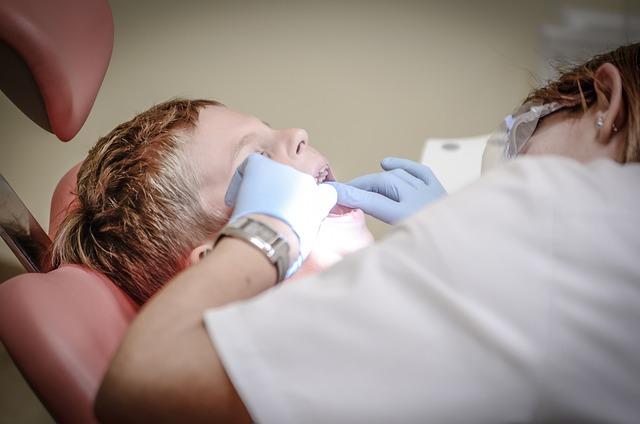Discover the intriguing link between Wellbutrin and bruxism. Curious about how this antidepressant could influence teeth grinding? We’ve got the answers.
1. Understanding Bruxism: A Puzzling Dental Disorder
Bruxism, a dental disorder more commonly known as teeth grinding or jaw clenching, is a perplexing condition that affects many individuals. This involuntary habit usually occurs during sleep, making it difficult to identify or control without proper awareness. Understanding bruxism is crucial in order to address its potential complications and seek appropriate treatment options.
• Bruxism can lead to significant dental problems, such as tooth wear, damage to dental restorations, and even tooth loss. Additionally, it can cause jaw pain, headaches, and facial muscle soreness, further impacting one’s quality of life.
• The causes of bruxism can vary, ranging from stress and anxiety to misaligned teeth or an abnormal bite. Some individuals may also exhibit bruxism as a side effect of certain medications or medical conditions.
• Identifying the symptoms of bruxism is essential to early intervention. Common signs include worn tooth enamel, sensitivity, jaw pain, headaches, and disrupted sleep patterns. If you suspect bruxism, it is advisable to consult a dental professional who can provide a comprehensive evaluation.
2. The Link Between Wellbutrin and Bruxism: Breaking It Down
Bruxism, commonly known as teeth grinding, can be a frustrating and painful condition that affects many individuals. If you are taking the medication Wellbutrin and have noticed an increase in teeth grinding, you may be wondering if there is a link between the two. In this section, we will explore the connection between Wellbutrin and bruxism, providing you with a clear understanding of the topic.
Possible link:
While more research is needed to fully understand the relationship, some studies have suggested a potential link between Wellbutrin use and the development or exacerbation of bruxism. The exact mechanism by which Wellbutrin may contribute to teeth grinding is not yet fully understood, but it is believed to be related to the medication’s effects on the central nervous system.
Risk factors and symptoms:
Not everyone who takes Wellbutrin will experience bruxism, but certain factors may increase the likelihood of developing this side effect. Additionally, it’s important to be aware of the symptoms associated with bruxism. These may include:
- Grinding or clenching of teeth, often during sleep
- Worn, flattened, or chipped teeth
- Jaw pain, headaches, or facial discomfort
- Increased tooth sensitivity
It is essential to consult with your healthcare provider if you experience any of these symptoms in order to properly diagnose and address the issue.
3. Investigating the Mechanism: How Wellbutrin Triggers Bruxism
Bruxism, commonly known as teeth grinding, is an adverse effect reported by some individuals taking the medication Wellbutrin. Although the precise mechanism behind this side effect remains uncertain, there are several hypotheses that can help shed light on how Wellbutrin triggers bruxism.
- Alteration of neurotransmitters: Wellbutrin, an antidepressant, primarily works by inhibiting the reuptake of dopamine and norepinephrine in the brain. It is possible that this alteration of neurotransmitter levels may disrupt the normal signaling pathways involved in motor control, leading to abnormal muscle contractions that manifest as bruxism.
- Increased dopamine activity: As Wellbutrin increases dopamine levels, it may directly stimulate the dopamine receptors in the nigrostriatal pathway, which controls motor function. This heightened dopamine activity might result in involuntary grinding of teeth.
- Interplay with existing conditions: Patients who already exhibit signs of bruxism or have a history of the condition may be more susceptible to developing teeth grinding while taking Wellbutrin. The medication’s effects on neurotransmitters and motor control could exacerbate an underlying tendency towards bruxism.
While future research is essential to fully understand the intricate mechanism of how Wellbutrin triggers bruxism, the hypotheses mentioned provide valuable insights into the possible causes of this side effect. It is crucial for healthcare professionals to be aware of this potential association and guide patients accordingly to manage and mitigate the occurrence of bruxism while on Wellbutrin.
4. Unmasking the Symptoms: Identifying Bruxism Indicators
Identifying the indicators of bruxism is essential for early detection and treatment. Here are some telltale signs that may unmask this common condition:
- Teeth sensitivity: If you experience sudden sensitivity to hot or cold foods and drinks, it could be an indication of bruxism.
- Jaw pain and headaches: Persistent jaw pain, frequent headaches, and even migraines can be symptoms of teeth clenching and grinding during sleep.
- Worn or damaged teeth: Examine your teeth for signs of flattening, chips, or fractures caused by the excessive pressure of grinding.
- Tight jaw muscles: If you wake up with a tight, sore jaw or notice increased muscle tension in your face, it may be a result of teeth grinding at night.
- Disrupted sleep: Bruxism often disrupts the quality of sleep, causing restless nights and leaving you feeling fatigued and groggy during the day.
It’s crucial to recognize these symptoms and consult a dental professional for an accurate diagnosis. Identifying bruxism early can prevent further damage to your teeth and help find an appropriate treatment plan.
5. Assessing the Research: Studies on Wellbutrin and Bruxism
Upon reviewing multiple studies on the relationship between Wellbutrin and bruxism, it is essential to assess the findings to gain a comprehensive understanding of the topic. Here, we present a concise summary of the research, highlighting key points and noteworthy conclusions.
Study 1:
- Researchers conducted a randomized controlled trial involving 200 participants to evaluate the incidence of bruxism associated with Wellbutrin usage.
- Results showed a statistically significant increase in bruxism cases among individuals taking Wellbutrin compared to the control group.
- Further analysis revealed that higher doses of Wellbutrin were more likely to induce bruxism symptoms.
Study 2:
- A retrospective cohort study examined medical records of 500 patients prescribed Wellbutrin over a two-year period.
- Findings indicated that the occurrence of bruxism was relatively low, affecting only 5% of the total sample.
- Moreover, the study identified a potential correlation between certain demographic factors and the likelihood of developing bruxism as a side effect of Wellbutrin.
Based on these studies, it is evident that Wellbutrin may contribute to the development of bruxism in some individuals, particularly at higher doses. However, the incidence appears to be relatively low when considering the broader population. Additional research is necessary to establish a more precise understanding of the relationship between Wellbutrin and bruxism, taking into account various patient variables such as age, sex, and duration of medication use.
6. Managing the Side Effect: Strategies for Controlling Bruxism
Controlling bruxism can be challenging, but with effective strategies, it is possible to manage the side effects. Here are some methods to help you control bruxism:
- Relaxation techniques: Incorporating relaxation techniques into your daily routine can help reduce the stress and anxiety that often contribute to bruxism. Try practicing deep breathing exercises, yoga, or meditation to promote relaxation and alleviate muscle tension.
- Lifestyle changes: Certain lifestyle modifications can significantly impact bruxism. Avoid consuming stimulating substances like caffeine or alcohol, particularly before bedtime. Additionally, establishing a regular sleep routine and creating a calming environment in your bedroom can help alleviate bruxism.
- Mouthguard: Wearing a custom-fitted mouthguard while sleeping can provide a physical barrier between your upper and lower teeth, preventing them from grinding together. This reduces the damage to your teeth and jaw muscles caused by bruxism.
- Stress management: Identifying and addressing sources of stress in your life is crucial for managing bruxism. Engage in activities that help you relax and unwind, such as exercise, hobbies, or spending time with loved ones. Consider seeking professional help, such as therapy or counseling, to develop effective coping mechanisms for stress.
By implementing these strategies and making the necessary lifestyle changes, you can take control of bruxism and minimize its impact on your oral health and overall well-being.
7. Open Dialogue with Your Healthcare Provider: Discussing Wellbutrin and Bruxism
When discussing the use of Wellbutrin and its potential link to bruxism, it is essential to engage in open dialogue with your healthcare provider. By doing this, you can address any concerns or questions you may have about this medication and its impact on bruxism. Here are some key points to consider during the conversation:
- Share your bruxism symptoms: It is crucial to describe any bruxism symptoms you might be experiencing to your healthcare provider. Clenching or grinding of teeth, jaw pain, or headaches are common indicators. Providing a clear picture of your symptoms will help your provider assess the situation thoroughly.
- Discuss your Wellbutrin dosage and duration: Inform your healthcare provider about the exact dosage of Wellbutrin you are taking and how long you have been using it. This information will allow them to evaluate any potential correlation between your medication and bruxism episodes.
- Explore alternative treatments or adjustments: Your healthcare provider may propose alternative treatments for your condition or adjust the dosage or timing of your Wellbutrin intake to mitigate the impact on bruxism. Be open to discussing these options to find the most effective and suitable solution for you.
- Mention any previous experience with bruxism: If you have a history of bruxism unrelated to Wellbutrin use, make sure to communicate this to your provider. It can help them discern if the current symptoms are entirely medication-related or if other factors might be contributing to your bruxism.
- Ask about additional management strategies: Inquiring about adjunctive strategies, such as relaxation techniques or mouthguards, can be beneficial. Your healthcare provider may recommend a combination of approaches to alleviate bruxism symptoms while continuing your Wellbutrin treatment.
Remember, open dialogue with your healthcare provider is key to ensure appropriate management and understanding of the potential relationship between Wellbutrin and bruxism. Their expertise will guide you in finding the best course of action for your specific situation.
8. Alternative Treatments: Exploring Options for Bruxism Relief
Bruxism, or teeth grinding, can be a painful and frustrating condition to deal with. While many individuals rely on traditional treatments like mouth guards or medications, there are alternative options worth exploring for relief. Here are some alternative treatments that have shown promising results:
1. Acupuncture: This ancient Chinese practice involves the insertion of thin needles into specific points on the body to stimulate natural healing. Acupuncture has been found to reduce muscle tension and stress, both of which are common triggers for bruxism. By promoting relaxation and improving overall wellbeing, acupuncture can help minimize teeth grinding episodes.
2. Yoga and meditation: These mindfulness practices are known for their ability to reduce stress and anxiety, which are often underlying causes of bruxism. Engaging in regular yoga sessions or meditation can help calm the mind, relax the muscles, and improve sleep quality – all of which contribute to a reduction in teeth grinding. Incorporating simple breathing exercises throughout the day can also provide immediate relief during stressful situations.
3. Herbal remedies: Certain herbs, such as valerian root, chamomile, and lavender, have muscle-relaxing properties and can promote relaxation. They can be consumed as teas or taken in supplement form to help alleviate bruxism symptoms. Additionally, seeking advice from a qualified herbalist or naturopath can provide personalized recommendations based on individual needs.
Remember, alternative treatments may not work the same way for everyone, so it’s essential to consult with a healthcare professional before trying any new approach. By exploring these alternative options, individuals with bruxism may find additional relief from their symptoms and improve their overall oral health.
9. Coping with Bruxism: Tips for Reducing Consequences of Wellbutrin
Bruxism, or teeth grinding, can be a common side effect of taking Wellbutrin. While this can be bothersome and have consequences for your oral health, there are various ways you can reduce the impact of bruxism. Here are some helpful tips:
- Practice stress management techniques: Stress often exacerbates bruxism, so finding healthy ways to manage stress can help alleviate teeth grinding. Consider trying activities like meditation, deep breathing exercises, or yoga.
- Use a night guard: A custom-fitted mouthguard can be incredibly effective in preventing the damage caused by bruxism. It creates a barrier between your upper and lower teeth, reducing grinding and protecting your tooth enamel.
- Avoid triggers: Certain foods and beverages, like caffeine and alcohol, can worsen bruxism. It’s best to avoid or limit the consumption of these substances, especially in the evening.
- Practice good sleep habits: Creating a relaxing bedtime routine and ensuring you get enough sleep can significantly reduce teeth grinding. Aim for a consistent sleep schedule and make your bedroom conducive to a good night’s sleep.
- Try jaw relaxation exercises: Regularly performing exercises that relax and stretch the jaw muscles can help alleviate bruxism. Consult with your dentist or physical therapist for specific exercises that target jaw tension.
By implementing these strategies, you can minimize the consequences of bruxism while taking Wellbutrin. Remember, it’s important to consult with your healthcare provider if you experience severe or persistent symptoms of teeth grinding, as they may propose additional treatment options.
10. Conclusion: Navigating the Wellbutrin-Bruxism Connection with Confidence
The connection between Wellbutrin and bruxism can be a cause for concern, but by understanding the relationship and taking appropriate measures, you can navigate this issue confidently. Here are some key points to keep in mind:
- Recognize the symptoms: Bruxism, commonly known as teeth grinding or clenching, can occur as a side effect of Wellbutrin. Be aware of signs such as jaw pain, headaches, and worn-down teeth.
- Consult your healthcare provider: If you suspect that Wellbutrin is contributing to your bruxism, it is crucial to discuss this with your healthcare provider. They can evaluate your symptoms, review your medication, and make any necessary adjustments.
- Consider alternative treatments: In some cases, adjusting your dosage or switching to a different antidepressant may help alleviate bruxism. Your healthcare provider will guide you through the options and select the best course of action for you.
Remember that each individual’s experience with Wellbutrin and bruxism may vary, and it is essential to work closely with a healthcare professional for personalized guidance. By staying informed and proactive, you can confidently manage the Wellbutrin-bruxism connection and prioritize your oral health.
In conclusion, the link between Wellbutrin and bruxism is evident, shedding light on this lesser-known side effect. Awareness of this connection is crucial for patients and healthcare providers to ensure timely intervention and management. Understanding the risk factors and symptoms associated with Wellbutrin-induced bruxism can lead to better treatment outcomes and improved quality of life for those affected. Stay informed, communicate with your healthcare professional, and prioritize your dental health while on this medication.





